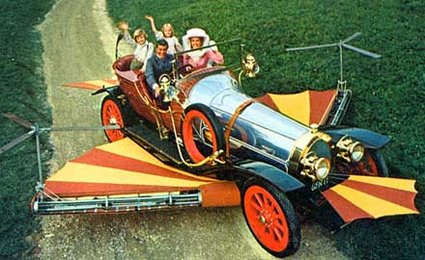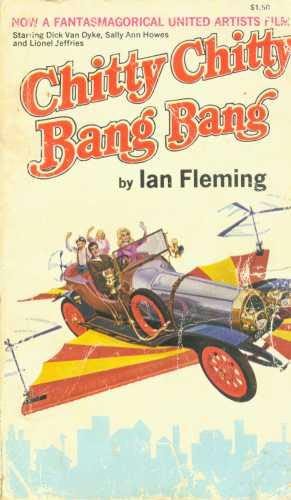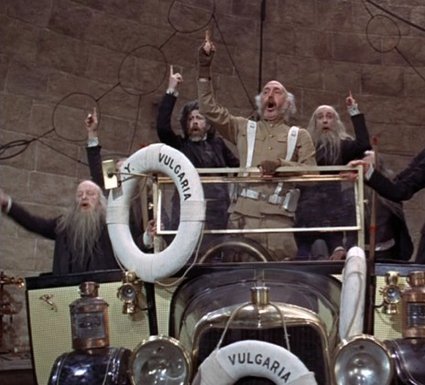Each week, Frequency Rotation digs up a different song with a science fiction or fantasy theme. Genre, musical quality, and overall seriousness may vary.
In honor of Steampunk Fortnight, I figured I’d pick a steampunk-themed song for this week’s installment of Frequency Rotation. Easy, right? After all, there are dozens of bands out there today hoisting the steampunk banner. But rather than pick a new song by a new artist, I wanted to go back a little further. How much further? 1968: the year of the great, often overlooked steampunk milestone, Chitty Chitty Bang Bang.
As Stephen Hunt pointed out in his Great Steampunk Timeline earlier this week, the cinema of the 1960s flirted with the style of retro-futurism that would become known as steampunk. Hunt didn’t mention Chitty Chitty Bang Bang—his Timeline clearly wasn’t meant to be all-inclusive—but there’s no denying that the film’s Edwardian airships and brass contraptions strongly evoke steampunk’s celebration of spectacle, anachronism, and ingenuity.

But besides the fact that the movie has, you know, a flying car circa 1910, it pumps out some honest-to-God steam. In the musical number “The Roses of Success,” the eccentric Grandpa Potts—father of fellow inventor Caractacus Potts, possessor of the most steampunk name in history—is jailed in a workshop in the fictional nation of Vulgaria and forced to help devise a floating, flying car. The philosophical message of “Roses” may as well be steampunk’s motto: “Every shiny dream that fades and dies / generates the steam for two more tries!”
Grandpa Potts is played superbly by actor Lionel Jeffries, who died in February of this year after a long and respectable career. It’s worth noting that in 1967, the year before Chitty Chitty Bang Bang was released, Jeffries also starred in another of the decade’s steampunk-flavored films, Jules Verne’s Rocket to the Moon. Rocket was released in the States under the name Those Fantastic Flying Fools—not to be confused with 1965’s vaguely steampunkish Those Magnificent Men in Their Flying Machines—and it echoes, albeit in a sillier fashion, the 1902 steampunk cornerstone, A Trip to the Moon.
Like A Trip to the Moon, Rocket is loosely based on a bona fide steampunk classic, Jules Verne’s From the Earth to the Moon. As Hunt’s Timeline mentions, the midcentury saw some other Verne adaptations make it to the big screen, namely 1954’s 20,000 Leagues Under the Sea and 1969’s Captain Nemo and the Underwater City. What sets Chitty Chitty Bang Bang apart is the fact that it’s based on a far fresher source: the 1964 children’s book of the same name written by James Bond creator Ian Fleming.

Chitty Chitty Bang Bang’s screenplay was co-written by Roald Dahl, which makes sense, seeing as how the scenes set in the Scrumptious Sweet Company uncannily parallel parts of Dahl’s own book from 1964, Charlie and the Chocolate Factory. (Although Charlie himself wouldn’t make it to the big screen until 1971.) But what’s even more interesting to the steampunk fan is Scrumptious’s elaborate, clockwork Toot Sweet Machine—also known as the Humbug Major Sweet Machine, a real-life kinetic sculpture built by the great Frederick Rowland Emett, a man who should be awarded some kind of posthumous Steampunk Nobel Prize. (The Toot Sweet Machine is the first gizmo in the video below.)
And just in case you need any more proof of Chitty Chitty Bang Bang’s steampunk pedigree, here is the film’s title song, along with the scene that accompanies it—complete with goggles, a race against a steam train, and the wheezing engine of the fantabulous auto that jumpstart the song’s pistonlike rhythm. People nowadays like to gripe about the fact that the 21st century has arrived, yet they haven’t gotten their futuristic flying car. Me, I’ll take the rickety one from 1910 any day.
Jason Heller writes for The A.V. Club, plays guitar in some bands, and will have “Chitty Chitty Bang Bang” stuck in his head all goddamn day now. His debut novel will be published by Quirk Books/Random House in 2012.










